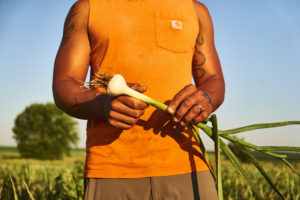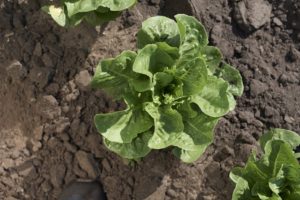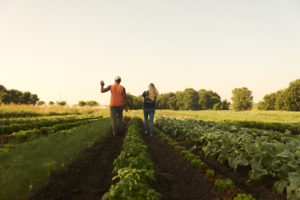
When COVID-19 first had people panic shopping and stockpiling meat earlier this year, farmer T.D. Hollub started getting emails. His farm’s current CSA customers were glad they had a secure source of food coming their way, and others wanted in, too.
“It’s so nice to know where your food comes from, and it’s really nice if you have those connections,” Holub said. “We’re starting to see what can happen when something starts to happen to our food supply.”
With farmers markets closed or modified, Holub and his wife, Sarah, were able to expand their CSA at Garden Oasis Farm LLC a bit to accommodate more members. The customers were grateful to be part of a resilient local system rather than a more vulnerable global one, feeling a sense of connection to their food that Holub has always known.
Holub grew up on a traditional farm in Coggan, Iowa. His parents raised row crops and cattle, and he loved everything to do with farming and being outside. Since childhood he dreamed of becoming a farmer, too.
“The lifestyle I think is just in your blood,” he said. “If it’s something you enjoy doing, it never goes away. The thing you’re always told is, you don’t want to be a farmer. There’s no money in it.”
So Holub left Coggan for the University of Iowa, where he majored in health and human physiology. He said Dr. Kathy Mellen, Field to Family Board President and a professor his major, taught him a lot. Mellen specializes in nutrition and focuses many of her lessons on food.
Dr. Mellen explained that several leading causes of death are related to poor diet. While personal choice plays a role, community and policy factors have an influence, too.
“Small-scale vegetable farmers are an important part of the food system,” she said. “Policies that support their work can help provide access to all consumers in the community. In addition the foods they grow have clear health benefits so it’s vital to ensure their vegetables make it into the diets of all in a community.”
Inspired by Dr. Mellen, Holub had a new plan for his future.
“It’s not just that you’re alive, it’s that you’re getting quality time out of your life,” he said. “(I realized I could) directly contribute to that wellness by growing food.”
Degree in hand, Holub headed back up to Coggan to be a farmer, albeit with a different kind of farm than his parents’. On just 10 acres, he set up growing diversified veggies with organic practices, and raising chickens, too. Met with the various challenges of being a young and beginning farmer, Holub said the first few years were like a “crash course” in growing food, running a business and marketing his farm.
“I think I’m kind of lucky I work with people who want to work with me,” he said.
Holub’s on a mission not only to provide healthy options to the customers he’s gotten to know, but to empower the people he feeds to know their food.
He said he hopes those people gain an understanding for the effort that goes into producing quality products like his, too, connecting with his products on a deeper level than typical groceries. He hopes they see how he’s at the mercy of Mother Nature, with bad storms this summer battering some of his crops and infrastructure, risking his profits to feed them good food.
He is driven to work toward a better future, one with a food system more capable of sustaining itself into the future for people like his 17-month-old daughter. He said she’s already trying to help on the farm, growing up just as connected to her food as he was.
“To watch my little girl grow up and experience these things for the first time…it makes me forget all the negative things that are going on,” Holub said.


